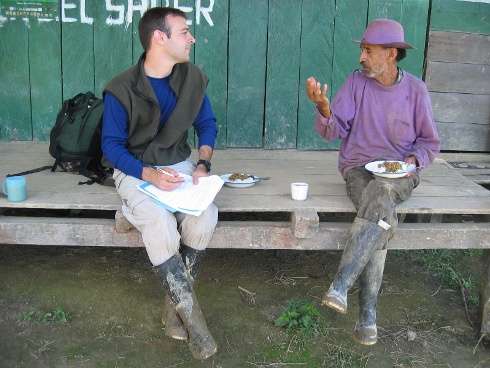Successful natural resource management built on trust

Trust is an important driver of collaboration, conflict resolution, and enhanced group performance in the business world as well as in the management of natural resources.
"One thing we can be sure of in ecosystem management is that we don't know all the answers," said Marc Stern, associate professor of the human dimensions of natural resources in Virginia Tech's College of Natural Resources and Environment. "Therefore, collaborative learning and innovation is particularly important to successfully navigating natural resource management in our ever-changing ecological and social contexts."
"Trust between multiple stakeholders—including government agencies, environmental groups, industry, and local citizens—is essential to build the types of collaboration necessary to effectively govern natural resources and draw on the talents and knowledge of diverse groups of people," said Stern, who teaches in the Department of Forest Resources and Environmental Conservation.
For example, a study of Podocarpus National Park in Ecuador, U.S. Virgin Islands National Park, and Great Smoky Mountains National Park in North Carolina and Tennessee found that local opposition or support could be predicted with nearly 80 percent accuracy based on local trust for park managers alone, he said.
Speaking at the International Union for Conservation of Nature World Parks Congress, Stern described how four forms of trust may play a role in building resilient collaborations for natural resource management.
"We can think of trust developing in four different ways," Stern explained. "The first type we call dispositional trust. Some people are predisposed to be generally trusting or generally distrusting."
The other three forms of trust are the results of actions.
"Rational trust is based on the expected benefits of an action. For example, industry may look for a promise of continued timber harvest, or an environmental group may expect protection of an endangered species," said Stern. "Rational trust is based on perceptions of consistent performance, predictability, and competence."
"Affinitive trust develops primarily through social relationships. Rather than explicitly calculating a predicted outcome, we trust based on an affinity for an individual, such as the park manager," he said.
The third form of action-based trust involves faith in the system of procedures or rules.
"If I trust the system, I don't have to trust the individuals as much. However, over-reliance on the system might actually preclude other forms of trust from developing," Stern said.
Stern, who is also a Fellow of Virginia Tech's Center for Leadership in Global Sustainability, recommends developing both interpersonal and procedural trust systems. "Similar to biodiversity in ecosystems, trust diversity strengthens the resilience of social institutions," he explained. "If one type is lost, the presence of other types may buffer the system.
"The most resilient collaborations have sufficient stocks of all three of the actionable forms of trust. For example, if affinitive trust is lost because of personnel change, rational and systems-based trust can buffer the system while it is rebuilt with a new individual. Without the other forms in place, it may be much harder to recover."
Discover the latest in science, tech, and space with over 100,000 subscribers who rely on Phys.org for daily insights. Sign up for our free newsletter and get updates on breakthroughs, innovations, and research that matter—daily or weekly.
There are no magical tools for building trust, he said, but there are important elements. Consistent performance and predictable benefits build rational trust. Trust in systems often develops where procedures were developed collaboratively and decision-making processes are transparent and equitable.
Affinitive trust often flows from opportunities for informal interactions, such as field trips and shared meals. Dialogue and responsiveness are critical.
Stern's research has found that short-term engagement can often inhibit trust development, while longer term, consistent commitments can enhance it. For example, in most areas around Podocarpus National Park, local organizations operate on short granting cycles and are absent during unfunded periods. In the few cases where organizations have maintained consistent presence in local communities and have built rational, affinity-based, and systems-based trust, local communities are working as partners with the park.
"Trust relationships do not exist independently of other relationships," Stern explained in an article published in November 2014 in Society and Natural Resources. "For example, a process leader who works for a government agency may feel accountable to her agency, her supervisor, her team, her project's goals, procedural compliance, and multiple other stakeholders, not to mention her own personal beliefs.
"Or a representative of a nongovernmental conservation organization may develop strong interpersonal trust with an industry representative. However, she may not feel able to act upon that trust based on her accountability to the other members of her organization.
"Multiple confounding factors may intervene before an intention is translated into action, but trust can at least allow for reasoned discourse and mutual respect in negotiation around that action and its alternatives," he concluded.
More information: "The Multidimensionality of Trust: Applications in Collaborative Natural Resource Management." DOI: 10.1080/08941920.2014.945062
Provided by Virginia Tech

















